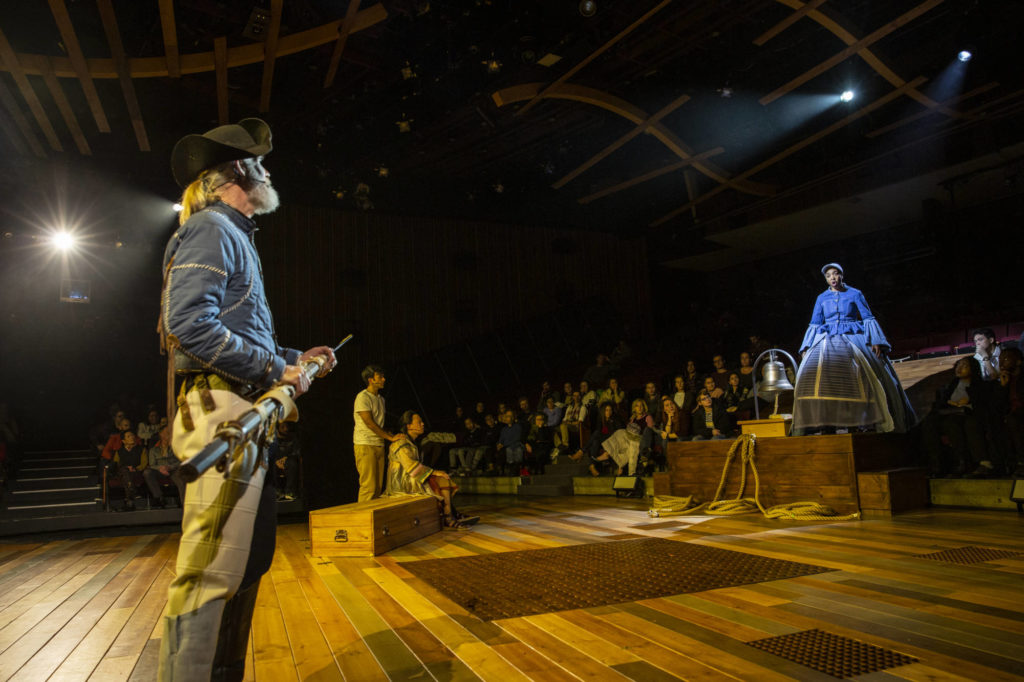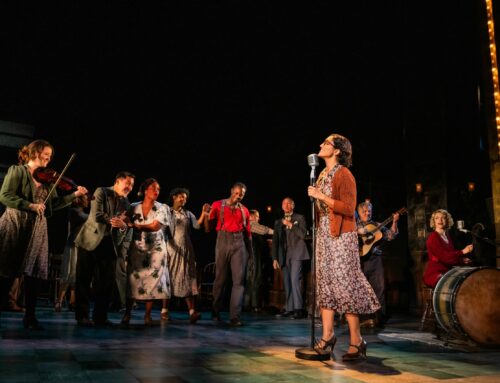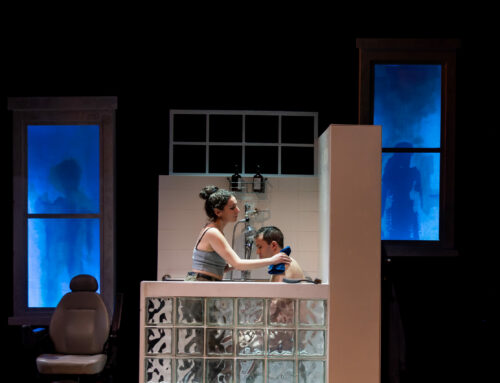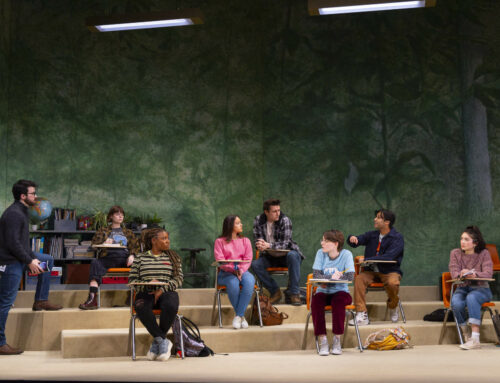The American Repertory Theater’s world premiere “musical reckoning” of Melville’s masterpiece MOBY DICK is nothing to sneeze at. And yet, that’s what I did in the penultimate moments of this 3 1/2 hour magnum opus; my attempt to stifle a freakish, out of the blue, nasal explosion backfired, and to my utter shock and awe, a sound like the shriek of a wild sea bird escaped my control a split second before the final word “orphan” was uttered. As the cast came out to take its bows to wild applause, my embarrassment found an outlet in stifled fits of laughter, even as I prayed no one had heard my unearthly screech, or if they had, figured it must have been part of the elaborate production’s haunting soundscape. Should I apologize to the cast for my ill-timed gesundheit? Or might they understand? It was an Ahab of an achoo, senselessly willing itself on, a determined cry before disappearing into the void, destined to be remembered by me, Ishmael. Call me crazy. In my world, everything is a metaphor for everything else.
My inopportune exhalation notwithstanding, I sat through this expansive undertaking, enthralled by its Shakespearean scope, and consistently engaged in whatever unfolded within that overwhelming physical space courtesy of scenic designer Mimi Lien’s imagination. As I took my seat in the belly of the whaling Pequod, Ahab’s big boat, I was awestruck looking up at most of the theater monumentally rigged and limned, top to bottom, forward and aft by the bones of this mammoth seafaring vessel, akin to the beast it was chasing. There hovered Ahab, its one-legged, hollow-eyed captain on a death search for the whale that left him un-limbed, and we all knew how this would end up: the white monster would have the last laugh, but not before the audience, warned of seasickness, were invited to don red slickers and board small boats sailing toward the ship’s deck, where they were coaxed to squish their hands in blubber and “sperm,” and then be squirted with bloody spray. Melville’s world made a killing on killing whales, and this whale of all whales would avenge the commodified corpses of its own species sacrificed to the appetites of the 19th century in the form of heat, light, corsets, and Ahab’s own peg leg.
Rachel Chavkin, whose transcendent theatricalization of Tolstoy’s WAR AND PEACE “Natasha, Pierre & The Great Comet of 1812”at the A.R.T., here turns Melville’s tome into a sprawling, ambitious production– part narrative, part incantation, exorcism, pageant, allegory. This “musical reckoning” attempts to take it all in, story and story teller, Ahab and Ishmael, the literal and the poetic, the material and the spiritual, penetrating the place where all creeds, theories, and realms physical and metaphysical melt into the great white mask. In other words, it aims to encompass the unencompassable: meaning and madness, despair, death, and redemption, while updating the work’s original context by attending to the “isms” of our own American times: sexism, racism, classism, consumerism, all of it sailing on Melville’s “Noah’s arc” of humanity: Persians and Nantucket Indians, black Africans and white westerners, cannibals and Quakers, the enslaved and the conquering seamen, all here marvelously-attired and vividly personified by a first-rate ensemble of singing, dancing actors.
Some of it works. I was haunted by the gaunt and ghostly visage of the white-faced and wounded Ahab, Tom Nelis, mirroring the mysterious pale behemoth against whom he obsessively flails. I wish I could have heard him better. The narrator Ishmael of that most famous of opening lines (not exactly true!) was played by Manik Choksi as an everyman and was immediately unprepossessing; though I could hear him, I was not drawn to listening to him. Additionally, this production sometimes lumbered under the self-conscious weight of contemporary relevance. Fedallah’s (Eric Berryman) mocking rap and the immersively theatrical amusement park ride were silly, but I understood the latter as a way of dealing with Melville’s endless attention to the details of the science and pragmatics of whaling. The book, music, lyrics, and orchestrations by Dave Malloy, performed by a live band on a multi-tiered stage, meandered melodically and stylistically throughout, occasionally cohering into something we could grab onto like the beauty of a ballad sung at dusk, but more often as shapeless as the ocean without its salt, depth, and resonance.
I found most compelling the moments when the audience stayed put, and I could let go of its self-conscious theatricality, freighted with contemporary “meaning”: the white whale as the “white male.” Melville’s work is so expansive, richly opaque, and therefore so evocatively symbolic it can no doubt bear the load of infinite interpretations, however reductive. But I was most satisfied lingering in the moments when the staging, lighting (Bradley King) and language gave way to something larger and led me through a portal to the ineffable: Ahab’s final soliloquy, Pip’s (Morgan Siobhan Green) madness, the captain of the Rachel’s (Dawn L. Troupe) fierce humanity.
What is MOBY DICK after all? It subsumes any context and is about all of life itself. What does an ocean mean? What is our relationship to nature, to each other, to God as mortals? How do we know what we know? What do we tell ourselves about ourselves in The Old Testament and The New, from Jonah to Jesus? This production never fully allowed me to become unmoored and access what Keats called “Negative Capability” when one dwells “in uncertainties, mysteries, and doubts,” as this material surely beckons us to do. But I admired the breadth of this effort, and know I was aboard a theatrical ship in the throes of tackling this beast of a life–and surely able to accommodate an errant sneeze. At the American Repertory Theater through January 12, 2020







Leave A Comment
You must be logged in to post a comment.